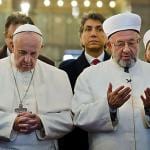A Muslim man convicted of murder has been executed in Alabama without his imam present, despite the man’s requests to have his spiritual advisor with him during his execution.
Domineque Ray, 42, was sentenced to death for the 1995 rape and murder of a 15-year-old girl. Ray specifically requested that the Christian prison chaplain be excluded from the execution chamber, and asked that his imam be present to “provide spiritual guidance for him at the time of his death.”
He also requested that he not be required to undergo an autopsy, as that would have conflicted with his religious beliefs. The warden reportedly denied the first two requests and said she had no authority to grant the third.
Consequently, the prison’s officials said they would allow the Christian chaplain, Chris Summers, into the execution chamber to kneel and pray with the prisoner, though the prisoner would not be required to pray with the chaplain. The officials reportedly said it would be a security risk to let a non-employee of the state’s correctional department into the execution chamber.
A federal appeals court on Wednesday granted a stay of execution until it could determine whether the prison had violated the Constitution’s Establishment Clause, after Ray appealed the prison’s decision. In defending the prison’s decision, the state said Ray’s imam, Yusef Maisonet, would be allowed to visit him on the day of the execution and could accompany him up until he entered the execution chamber.
The Supreme Court decided 5-4 Feb. 7 that Ray’s execution could go ahead, and he was subsequently executed that evening by lethal injection. The court’s majority cited the last-minute nature of Ray’s request as a reason for vacating the stay.
The Christian chaplain was reportedly excluded from the execution, as Ray had requested.
Justice Elena Kagan wrote a dissent, calling the court’s decision “profoundly wrong” and quoting from the court’s decision in the 1982 case of Larson v. Valente: “The clearest command of the Establishment Clause is that one religious denomination cannot be officially preferred over another.”
“But the State’s policy does just that,” she wrote.
UPDATE: This was released Friday from the USCCB:
On February 7, 2019, the State of Alabama executed Domineque Ray, a Muslim man whose request to have an imam present at his execution was denied by the U.S. Supreme Court by a vote of 5-4. Archbishop Joseph E. Kurtz of Louisville, Chairman of the USCCB Committee for Religious Liberty, and Bishop Frank J. Dewane of Venice, Chairman of the Committee on Domestic Justice and Human Development, have issued a statement, which reads:
“The execution of Domineque Ray deeply troubles us. The death penalty itself is an affront to human dignity, and the Church has long called for its abolition in the United States and around the world. Mr. Ray bore the further indignity of being refused spiritual care in his last moments of life, in violation of the First Amendment to the U.S. Constitution and Alabama law. This unjust treatment is disturbing to people of all faiths, whether Muslim, Christian, Jewish, or otherwise. People deserve to be accompanied in death by someone who shares their faith. It is especially important that we respect this right for religious minorities. As Pope Francis said during his recent trip to the United Arab Emirates, ‘What we are called to do as believers is to commit ourselves to the equal dignity of all.’ Let us make this commitment today.”













